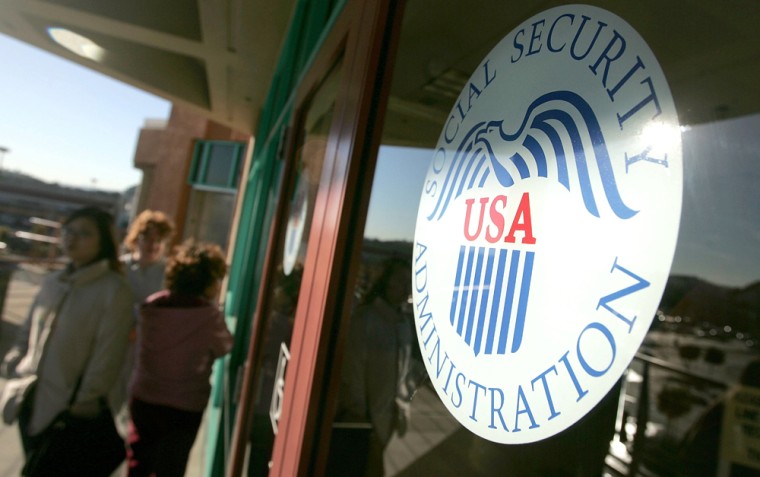Social Security benefits would not change for people who are near retirement — those 55 and older — under President Bush’s proposal for private accounts, but the government guarantee would drop for younger Americans, congressional Republican officials said Wednesday.
These officials, speaking on condition of anonymity because they did not want to pre-empt the president’s State of the Union address Wednesday night, said the reduction in the federal benefit would be larger for those who established personal accounts than for people who did not, on the assumption that investment income would more than make up the difference.
The Republicans said administration aides had informed them of the decisions while previewing Bush’s address, including his request for far-reaching Social Security legislation.
Cutoff date established
The administration long has said that benefits would not change for current retirees under any of Bush’s proposals and that the same would hold true for near-retirees of an unspecified age. The decision to recommend an age cutoff of 55 holds financial implications for millions of baby boomers.
In political terms, it also shows that the White House is moving to ease the concerns of an important political group as it seeks to build congressional and public support for far-reaching changes in the Depression-era program.
In a recent survey taken for House Republicans, older people expressed opposition to private accounts, while younger workers favored them. Near-retirees are “clearly the demarcation point on this issue,” the pollsters concluded, urging the House Republican leadership to tread carefully because of political considerations.
Bush has urged Congress to approve legislation that would place Social Security on a permanently stable financial foundation, at the same time giving younger workers the choice of diverting part of their payroll taxes into private accounts, which the administration calls “personal” accounts to sidestep what it sees as a stigma attached to “privatization.”
To make the financing work, administration officials have said the president may recommend a cut in the government benefits promised to younger workers when they retired, possibly in the range of 40 percent. Personal investment income could make up at least some of the difference.
Democrats contend that Bush’s proposals would add trillions of dollars to the national debt while privatizing a program that has kept millions of older people out of poverty since Social Security was created in 1935.
Answering the Democrats
Bush’s decision resolved one of many details confronting the administration as it tried to counter the Democrats’ most potent criticism, although a Republican official noted that lawmakers might want to set the age cutoff even lower.
Under Bush’s plan, according to an outside expert who was briefed by the White House, workers would be allowed to divert roughly two-thirds of their 6.2 percent payroll tax into a private account.
The remaining payroll taxes would continue to go into the Social Security trust funds, as would the entire 6.2 percent payroll tax paid by employers.
At first, individual contributions would be capped at $1,000 per year, a level that would rise by $100 a year until all workers could invest the full 4 percent.
All workers choosing to set up private accounts would be required to buy investments that would combine with their monthly government check to ensure income above the federal poverty level during retirement.
Under one approach favored by Bush’s aides, workers choosing to invest some of their payroll taxes would have a handful of options, including a “life cycle” account in which investments became more conservative as investors aged and approached retirement.
Another possibility, according to senior Republican officials, would require that at least some retirees buy investments guaranteeing them a specified monthly or annual income until their death. The income would be in addition to their monthly Social Security benefit.
Under one variation, any funds that remained available under these annuities after death would revert to the government, meaning the money could not be inherited. While that would ensure retirees a monthly check while they live, it also could undercut what polling shows is one of the most persuasive arguments on behalf of private accounts, that they could be inherited.
The details emerged as the Senate Finance Committee held the year’s first hearing on Social Security, and Democrats on the panel used the opportunity to criticize Bush on the issue.
“The kind of plan the president seems to be suggesting would mean deep benefit cuts for retirees,” said Sen. Max Baucus, D-Mont. “And it would also mean massive increases in debt for the federal government. That is a bad combination.”
